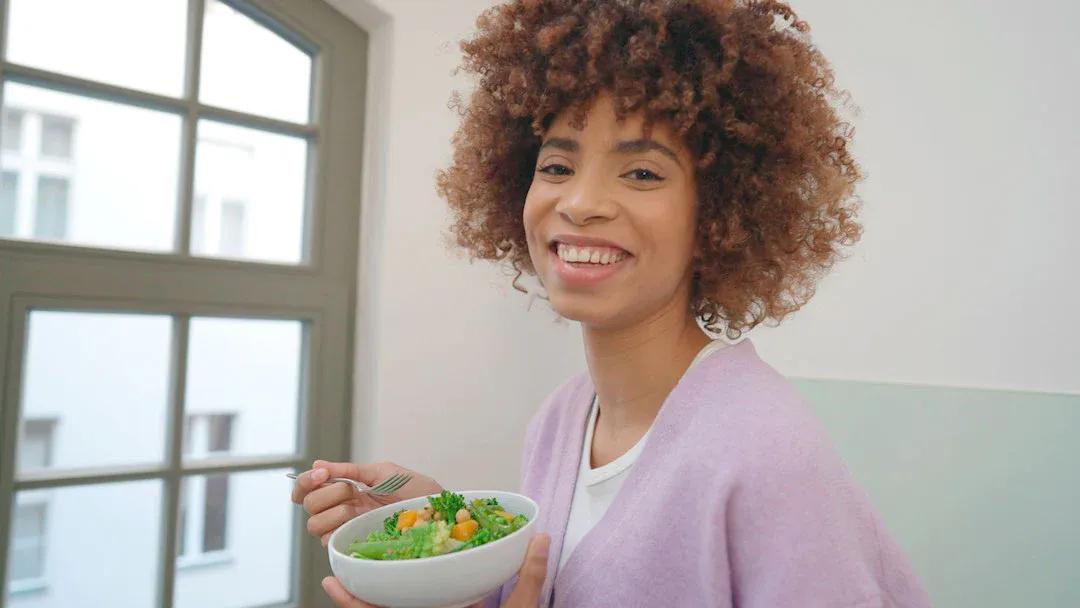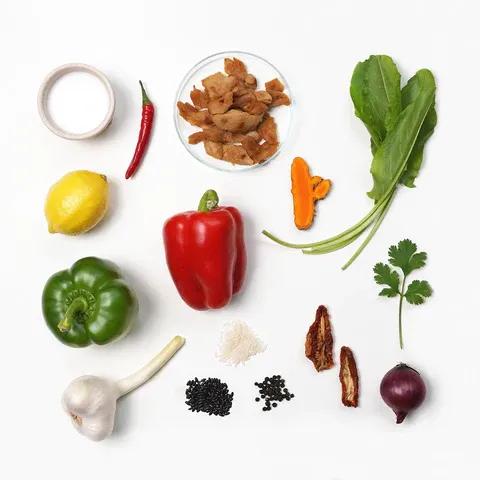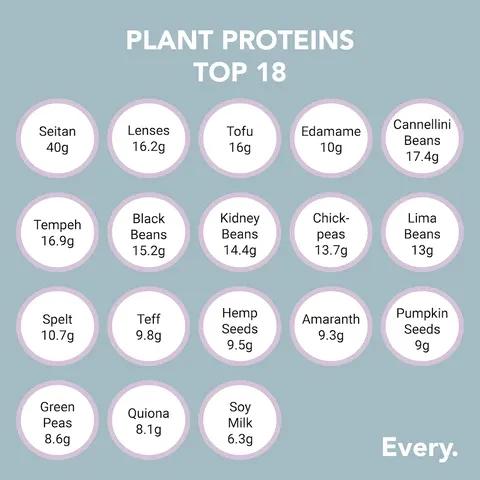Vegan Eating – Everything You Need to Know
People who follow a vegan diet avoid animal products of any kind. We discuss the advantages and criticisms of this popular lifestyle.

In Germany, over 1.41 million people are vegan, and this number continues to grow. Worldwide, the vegan movement is increasing in popularity and for many, it is not just a diet, it's an entire lifestyle. We take a closer look to find out why, and how.
Contents of this article:
- What is vegan eating?
- What are the reasons why people eat vegan?
- Veganism: challenges and prejudices
- Which foods are vegan?
- Do critics have a point
- Easy, vegan eating
- 5 tips to kick-start your vegan lifestyle
What is vegan eating?
Anyone who decides to follow a vegan diet, chooses to eliminate any kind of animal products. This means no meat, fish, dairy products or honey. Vegan eating, is just one expression of veganism. Veganism as a whole encompasses much more than just diet. A vegan lifestyle involves not only cutting out animal food items, but any product that involves animals, originates from them or involves them for testing. Things like leather and fur are an absolute taboo. So are hygiene and cosmetic products that contain animal-based additives (e.g. Glycerin or Gelatine) found in things like certain lipsticks, toothpastes or shampoos. The same applies for any products that have been tested on animals. In short: 100% of all products involving animals are forbidden.

What are the reasons why people eat vegan?
This isn’t a question that can be answered generally, as the motivations for everyone are very different. There are a multitude of reasons why people choose to go vegan, ranging from environmental to social to personal health. Some eat plant-based foods to minimise their environmental impact. A vegan diet is an excellent way to reduce individual carbon emissions while the protection of animal welfare is also a powerful reason. Others might use it as a way to improve their health, lose some weight or manage cholesterol levels. To others, meat and fish might simply not taste good to them.
In addition to these factors, the social pressure to adapt our diets is mounting. The role agricultural practices play in the global carbon output is striking. With the climate crisis demanding immediate and drastic changes, more and more people are adapting more sustainable lifestyles, with a focus on conscious consumerism, and in particular food choices.
It’s no secret that the production of animal products, factory farming in particular, is a major polluter. Raising livestock emits high amounts of carbon dioxide and other greenhouse gases. It is also an incredibly ‘thirsty’ industry compared to cultivating crops. Approximately 15,500 litres of water are needed to produce 1kg of beef. In comparison, the water consumption of 1kg of potatoes is about 210 litres and that of 1kg of strawberries 280 litres - quite a difference. While the environmental reasons should be compelling enough, factory farming is also a notoriously harrowing experience for the animals. Living conditions are miserable, with limited exercise or sunlight. These animals experience extreme suffering and stress and is an unethical industry that should be seriously questioned.
Veganism: Challenges and prejudices
Any vegan eater, has probably heard one of these: ‘’You can’t get everything your body needs from plants!’’, ‘’No meat or dairy can't be healthy’’ or ‘’How are you going to build muscle without meat?’’
There are many criticisms that are ill informed and it's time to clear up some of these myths!
Anyone who is vegan, is harming their body
Just because you eliminate animal products from your diet, does not mean your body is deprived or susceptible to damage. Regardless of whether you're adjusting your food habits or pursuing a diet, the important thing is that you have a balanced plate and ensure that you have a steady supply of essential nutrients and vitamins, as well as fibre and trace elements. This also works great, you guessed it, completely without meat.
In order to achieve a well-balanced and nutritious diet, you should eat about 5 portions of fruit and vegetables per day. These are a good source of Vitamins C and D, as well as calcium and trace elements. Whole grains and legumes such as lentils and beans, are a great source of protein and rich in Vitamin B, Iron and Zinc. Nuts, Oilseeds and nutritious oils contain essential omega 3 and omega 6 fatty acids–so eat lots of those! Iodine can be simply swapped out for a sprinkle of Iodine-Salt. The only real thing that can’t be substituted, and is only found in animal products, is Vitamin B12. This can be supplemented easily.
Building muscle only works with animal protein
The assumption that a steamed chicken breast or egg-white omelette are essential for muscle building, should be a thing of the past. So is the assumption that animal-based protein is somehow better or more effective in muscle building than plant-based protein. Many studies have researched and proven this (who’s seen The Gamechangers on Netflix?). At the end of the day, it's not the source but the amount of the protein that matters. On average, an individual should eat between 1.6-2.2g of protein per kg of body weight each day.
Protein-rich vegan foods include like legumes. Lentils, chickpeas and beans as well as pseudo-grains like quinoa or amaranth, to mention a few. Seeds, nuts and soy-containing products are also excellent protein sources. These include things like chia and linseeds, tofu, seitan and nuts.
These ingredients are not only a great source of protein, they also contain high amounts of unsaturated fats, nutrients and fibre. They are also low in cholesterol or saturated fats. The same cannot be said for animal-based proteins, which usually contain these less health-promoting properties which at high quantities can affect cholesterol levels and blood pressure.
Here a useful list of plant-based protein sources:

All vegans are hippies
Anyone who chooses to be vegan has their individual motivations to do so, but everyone makes the decision quite consciously because it does require planning. People who are vegan, arguably live a more conscientious life by pursuing a more harmonious coexistence with animals and their environment and minimising their own impact. This mentality might have been questioned in the past, but is increasingly becoming the norm. Conscious, aware, sustainable and ‘woke’ is the new mainstream. Not caring about how our behaviour and choices have an impact is no longer cool. A variety of very popular brands were founded on this new attitude. This includes parts of the livestock industry, with large industrial meat companies making the switch to manufacturing vegan meats. Fashion brands, too have been distancing themselves from leather, fur and the like and opting for sustainable alternatives. What is trendy and cool nowadays is anything that has been produced animal-and-animal-cruelty-free, fairly and sustainably.
Pregnant women, women who are breastfeeding, and children should definitely not be vegan.
This argument was put forth by the German Nutritional Society (DGE). The reason: these population groups have an above average nutritional requirement and are therefore more susceptible to deficiencies. If you are pregnant but still want to be vegan, then you should consult your doctor and be advised on the necessary supplements you might need to make sure you're extra covered. The same applies to young children: as they are still in a growth phase their plates should be diverse and colourful, making sure that each nutrient is supplied. Vitamin B12 should also be supplemented to support growth rates. Checking in with a doctor from now and then is never a bad idea.
Which foods are vegan?
Vegan eating can be a challenge sometimes. Not because eliminating things like meat and cheese are difficult (which they can be) but because some foods you suspected to be vegan, turn out to have hidden additives that render them non-vegan. These include gelatin, lactose or types of fats. Next time you're not sure, make sure to ask your baker if the bread was made with animal-free ingredients.
Foods that are vegan are things like grains, fruit, vegetables, nuts and seeds. The food industry has kept up with the hype, and delicious plant based alternatives now line most supermarket shelves. A rich assortment of vegan yoghurt, milks, cheeses, spreads, meats and hams can be found. Many restaurants have also followed suit and feature things like vegan burgers and schnitzels, chicken nuggets or vegan carbonaras. These often bear an uncanny resemblance to their animal-based counterparts and are full of flavour. Just as delicious but better for you and uses less resources.
Another overlooked trap can be among drinks and alcohol. What many don't know is that wine, champagne and some juices are often not vegan. This is because gelatine, an animal-product additive, is used to ‘clear’ the drink. During the ‘clearing’ process, turbid particles and remnants can remain. Though, here there is also a plentitude of alternative products, suitable for vegan eaters.Good news for beer connoisseurs and spirit-specialists. Germany has a purity law in place that prohibits beer manufacturers from using any animal-based ingredients. Most distilled liquors like gin, vodka, rum and tequila are also vegan.
Unsure whether a product is vegan or not? Many products contain the vegan label. The International Organisation for Standardisation (ISO) decides whether a food receives such a label. Since March 2021, only foods that are entirely free of animal products and additives are eligible to carry the vegan label.
Do critics have a point?
Sceptics of vegan eating typically base their arguments on the supposed nutrient deficit that arises from a vegan diet. However, as we have already discussed, these claims are unfounded and it is absolutely possible to nourish your body with everything that it needs from plant-based sources.
Another frequent criticism is that the high consumption of soy-products in the vegan community is responsible for the deforestation of rainforests. Again, inaccurate. Rainforest that is cleared is almost entirely devoted to the cultivation of soy crops used for animal feed and raising livestock, which is then slaughtered and consumed by humans. The average person living in Germany consumes approximately 60kg of meat per year, which requires about 36kg of soy-feed to produce. To harvest these amounts, about 150m2 of land is used per person. This highlights the significant amount of resources necessary to produce meat, and if meat production reduced, there would be more plant-based food to redistribute. In 2020, 122,000 km² of rainforest were destroyed in 2020 alone and 35.2% of this was devoted to livestock-feed.
Easy, vegan cooking
An energy-rich breakfast, a quick lunch or a fancy dinner–all are easy to achieve as a vegan, and even if you’re not a self proclaimed chef. It also doesn't have to mean ‘without’ it just means finding alternatives. Feel like having a bolognese? Delicious recipes with lentils, mushrooms and eggplant instead of ragu await. Vegetables can be prepared in all manner of ways, or even snacked on raw. The internet is saturated with delicious plant based recipes for you to discover.
And for those of us who don’t feel like cooking or are feeling extra uninspired, check out the Every. Collection. It is a vegan-lovers paradise–and add bonus, all the hard stuff has been done for you.

5 Tips to kick-start your vegan lifestyle
1. Why do you want to go vegan?
Regardless of the diet you choose to pursue, your reasons why should always be clear. Do you just want to test it out? See if you feel fitter, better or more energised? Do you want to lose weight? Are they environmental reasons? Think about why you really want to do this. This can help act as a motivator down the line if you're ever at risk of falling off the bandwagon or just need a reminder.
2. Replace instead of eliminate
As we’ve learned, eating vegan means avoiding meat, fish, and dairy products. So does that mean we need to eliminate all of these things for good? No, because anything you ‘eliminate’ must be replaced somehow, so as to ensure you are still getting all the nutrients you need. Thanks to the immense variety, there are plenty of plant based alternatives you can easily incorporate into your diet instead of animal products.
3. Lots to discover!
Egg-alternative from lupins? Vegan fish created from the conjac root? Plant based chicken from peas? These are not futuristic, sci-fi foods, but actual items you can buy today! In addition to conventional supermarket offerings, more and more exotic produce is hitting the shelves, offering an even more diverse assortment of fruits and vegetables with which delicious things can be cooked up. And as mentioned, the internet is an excellent resource for vegan recipes.
Feel like having a carbonara? Swap out heavy cream for cashews and bacon for jackfruit or mushrooms. Meatless eating is not only delicious, it's fun too! A great way to recreate your favourite meals, but with a healthier, more sustainable twist! All you have to do is start experimenting and soon you’ll find your new favourite recipe.
4. Planning is everything
Off to lunch with colleagues? Going to a birthday dinner later? Wherever you are, you should try and plan your restaurant visits. Nowadays, most restaurants have at least one vegan option especially in large cities. However, it's never a bad idea to check out the menu ahead of time. You can also always ask if the restaurant is willing to make a vegetarian meal vegan.
5. Don’t be too hard on yourself
Grandma made her favourite cheesecake and it's calling your name? Being vegan 100% of the time can be challenging for some–but then again, which diet isn’t? The good thing is, you’re in charge and if you want to have a cheat day once in a while, that’s totally ok too. As we’ve learned, harsh discipline can be a motivation killer. So having the occasional non-vegan food can actually help you stay on track. So don’t be too hard on yourself and if you want the occasional treat, go for it! It still means you're like 99% vegan.
Veganism is an exciting topic, which will be around for decades to come. The advantages of vegan diets and lifestyle are gaining attention and the popularity made event by the response from the food and restaurant industries. Critics persist, as with any non-ordinary diet, but simultaneously, environmental and ethical arguments for making the switch are getting louder too. Whatever your motivation may be when it comes to trying or sticking to vegan eating, is to focus on balance. Foods should never be eliminated, simply replaced. Colourful plates are a great guideline and experimenting and discovering alternatives fun!
If you enjoyed this article, you'll love these as well!
- Vegan Protein Sources – The Key Facts
- Vegan Meat Alternatives – Everything You Need to Know
- Intuitive Eating – The Science of Listening to Your Body
- Food Waste – When Edible Food Lands in the Trash
- Quick and Healthy Lunch? Easy as Pie
For even more foodie-content follow us on Instagram and join the Facebook Community to get involved in meal creations and to stay up to date on all things Every.
